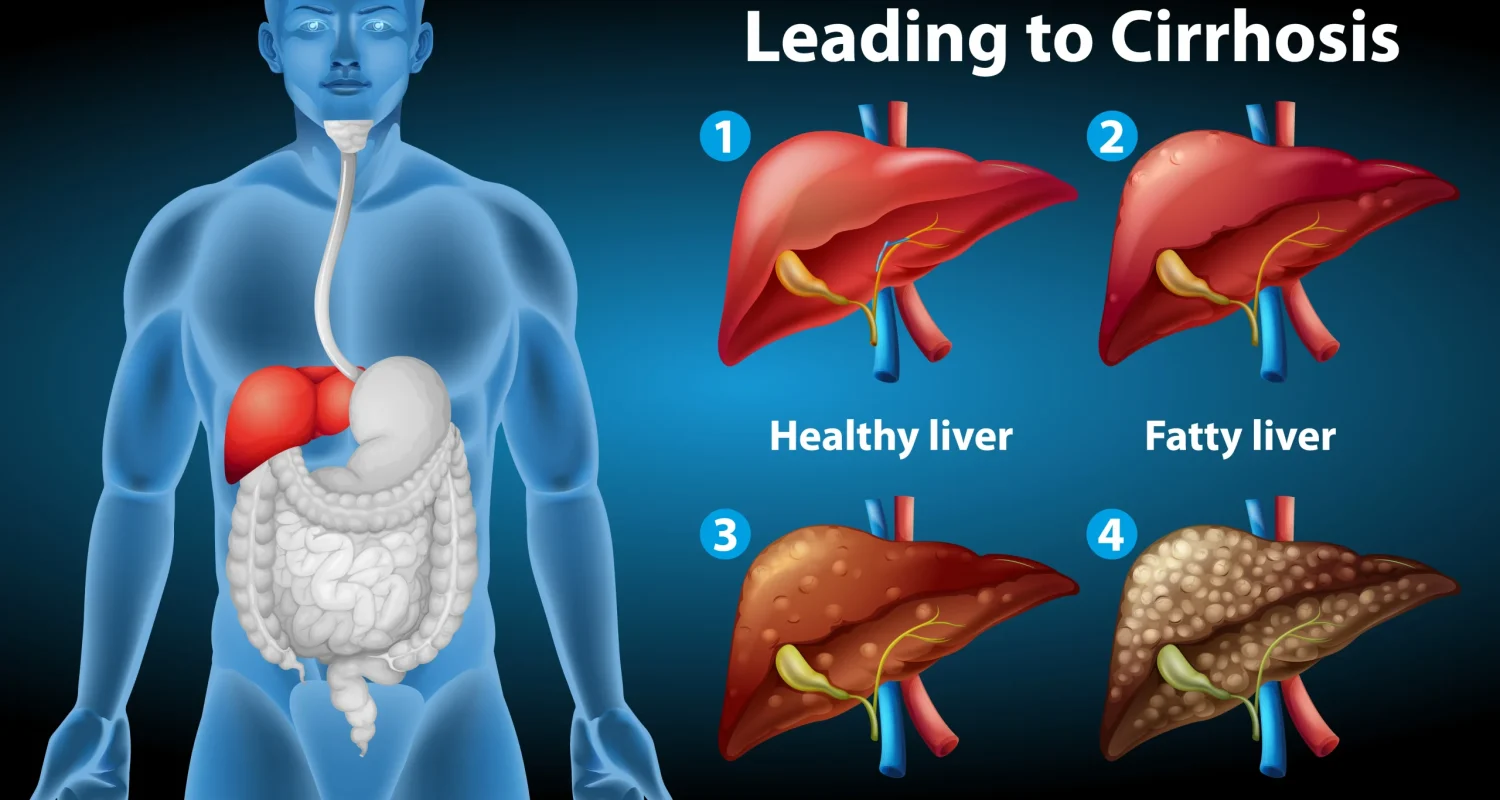- September 2, 2024
- By: admin
- No Comments
Liver Cirrhosis: The Impact of Hepatitis B and Hepatitis C Infections You Should Know About
Liver Cirrhosis: The Impact of Hepatitis B and Hepatitis C Infections You Should Know About

Viral liver infections are serious diseases on their own. But did you know that over the years, liver infections, especially hepatitis B and C can cause significant damage to your liver? Untreated or chronic hepatitis infection can cause permanent scarring of the liver, which is also known as cirrhosis. This can affect liver function.
To prevent such complications it is essential to consult a gastroenterologist or hepatologist to find the best treatment. Dr. K V Dinesh Reddy, with over a decade of extensive clinical experience in the field, is one of the best gastroenterologists in Hyderabad. Keep reading to learn about hepatitis and the risks it poses for developing long-term conditions. Also, discover preventive measures to minimize the risk of liver damage.
The Progression of Chronic Hepatitis to Liver Cirrhosis
Chronic infections with hepatitis B (HBV) and/or hepatitis C (HBC) viruses are the leading causes of cirrhosis worldwide. Cirrhosis develops after 10-20 years of viral hepatitis.
Chronic hepatitis is inflammation of your liver that lasts at least six months. It is commonly caused by HBV, HCV and certain drugs. The condition is not as common as acute hepatitis but can persist for years and even decades. Most people have no or mild symptoms, but some might experience vague symptoms such as loss of appetite, rapid weight loss, and fatigue. However, in some individuals, chronic hepatitis slowly causes inflammation and damage to the liver.
The liver has an extraordinary capacity to heal after damage. But, in cases of chronic hepatitis, the process is interrupted due to the repeated injury caused over the years. Eventually, the working efficiency of the liver declines and results in cirrhosis. Cirrhosis is a disorder in which healthy liver tissue is replaced by inactive scar tissue. The condition decreases liver function, which can lead to liver failure and, in rare cases, liver cancer.
Factors Influencing the Progression of Cirrhosis
Several common lifestyle factors can speed up the risk of cirrhosis, including:
- Consuming alcohol
- Having HCV and another virus, like HIV or hepatitis B
- Having a lot of iron in the blood
Anyone suffering from chronic HCV infection should abstain from alcohol. Cirrhosis can also worsen in adults over 45 when fibrosis and scarring worsen. In younger individuals, aggressive HCV treatment may help prevent the development of cirrhosis.

Diagnosing Hepatitis and Its Complications
If hepatitis is left untreated it can lead to significant problems. To diagnose hepatitis, the doctor will advise a blood test to detect the virus and determine its type. Other tests including imaging tests, such as an MRI, ultrasound, or CT scan and liver biopsy might also be recommended.
Preventing Cirrhosis Caused by Hepatitis
Vaccination against hepatitis B and C viruses is the best way to protect against cirrhosis. To prevent the progression of chronic hepatitis into cirrhosis, consider the following steps:
- Regular Screenings: If you have HBV and HCV, regular screenings for liver cirrhosis are crucial. This helps catch any development of cirrhosis at an early stage, allowing for timely intervention.
- Vaccination and Timely Treatment: Ensure you receive vaccinations on schedule for hepatitis B and seek treatment for HBV and HCV as recommended by your doctor. Timely treatment can help manage the progression of liver damage.
- Avoid Alcohol: Steering clear of alcohol is essential for maintaining liver health. Alcohol consumption can exacerbate liver damage, especially if you have hepatitis.
- Healthy Lifestyle: Embrace a healthy lifestyle by maintaining a balanced diet, exercising regularly, and managing your weight. These measures contribute to overall liver health.
- Regular Medical Check-ups: Embrace a healthy lifestyle by maintaining a balanced diet, exercising regularly, and managing your weight. These measures contribute to overall liver health.
Once you’ve successfully undergone treatment, the risk of encountering other liver complications is greatly minimized.
Effective Treatments for HBV, HCV, and Cirrhosis
Treating chronic hepatitis
The goal of treatment for chronic hepatitis is to prevent the disease from worsening and preventing cirrhosis and liver failure. The treatment of HBV and HCV includes highly effective, direct-acting antiviral medications. The newest medications have extremely high success rates. Treatment of HCV can last for a few months, and it can get rid of the virus from the body. This helps stop liver inflammation, prevents scarring, and keeps the liver from getting worse. After starting these medicines, it’s important to keep taking them because stopping them can make the inflammation reoccur.
Treatment of complications
Whether it’s HBV or HCV, if you have cirrhosis, you need treatment for that too. Advanced cirrhosis becomes difficult to treat due to complications like ascites (build-up of fluid in your abdomen) and hepatic encephalopathy (impaired brain function due to liver dysfunction). Ascites is treated by limiting salt consumption and using a diuretic (a medicine that helps the kidneys expel more sodium and water into the urine). Treating hepatic encephalopathy involves medications to assist the body in clearing toxic substances that might cause brain function to degrade. If the complications worsen, liver transplantation may be necessary. It is the only effective cure for advanced cirrhosis.
Takeaway
Major cases of cirrhosis occur due to hepatitis B and C infections. Therefore, it is essential to prioritize the prompt treatment of hepatitis to prevent further damage to the liver. Individuals who are infected with both HBV and HCV should have their liver cirrhosis checked. In the initial stages, cirrhosis might not exhibit noticeable symptoms. As a result, even if one doesn’t experience any apparent symptoms, it is strongly recommended to undergo screening. Timely diagnosis and effective management are key. Individuals with cirrhosis can live for many years, particularly when the condition is detected early and well-managed.
Consult Dr. K V Dinesh Reddy, one of the best gastroenterologists in Hyderabad, who specializes not only in providing effective treatments but also in ensuring prompt and accurate diagnosis. This aspect is particularly crucial in cases of hepatitis, where timely and precise diagnosis can make a significant difference in the overall outcome of the disease.
Best Hernia Surgeon in Hyderabad

Dr. K V Dinesh Reddy
MBBS; MS (Gen.Surg); DNB (Surg.Gastro)
Dr K V Dinesh Reddy is the best hernia surgeon in Hyderabad with over 10 years of experience in hernia treatment.
He has treated hundreds of hernia patients which makes him the best hernia surgeon in Hyderabad and known as the Best Bariatric surgeon in Hyderabad.
He strongly believes that surgery should only be considered as a last resort and prefers a holistic approach to treatment. So, if a disease can be effectively treated with medication, he never recommends surgery.
Frequently Asked Questions
Here are answers to some of the questions you might have about Impact of Hepatitis B and Hepatitis C
The common symptoms of chronic hepatitis are often mild and can include feeling very tired, losing your appetite, and sometimes losing weight quickly. Some people might not notice any symptoms at all. However, the condition can slowly damage the liver over time, even if symptoms are not obvious.
Hepatitis B or C can lead to liver cirrhosis by causing long-term inflammation in the liver. Over many years, this inflammation has damaged liver cells, and as the liver tries to repair itself, scar tissue forms. Gradually, this scarring builds up, replacing healthy liver tissue and reducing liver function.
While early cirrhosis can be managed and its progression slowed, advanced cirrhosis is irreversible, making early diagnosis and treatment crucial.
Hepatitis C can be cured with direct-acting antiviral medications, while hepatitis B can be managed with treatments to prevent the virus from causing liver damage.
Avoiding alcohol, maintaining a healthy diet, regular exercise, and adhering to prescribed treatments are essential for preventing cirrhosis.

